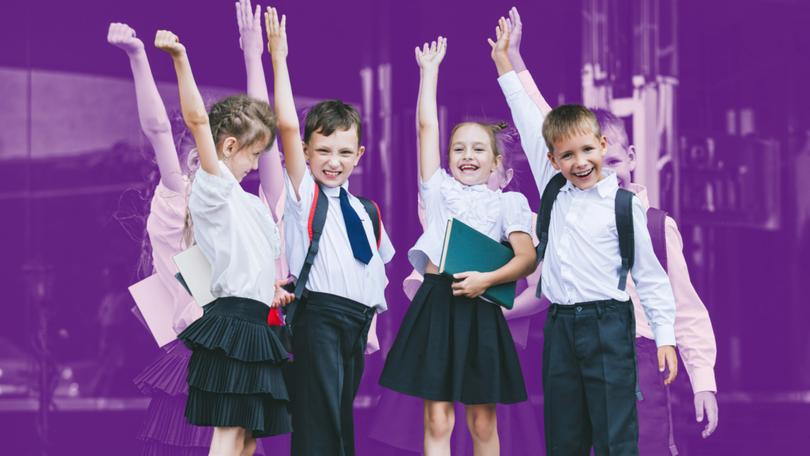JENI O’DOWD: Sure, public school may keep rich kids ‘grounded’, but why strain the system if you don't have to
JENI O’OWD: I love the idea of rich parents sending their kids to public school to ‘stay grounded’, but why put more pressure on the over-burdened system when you don’t have to?

I love that tech entrepreneur Sam Kroonenburg wants his five kids to “stay grounded” and avoid the pitfalls of privilege by sending them to a public school instead of an independent or private school.
But I hope he’s ready for the reality of public schooling: working bees, getting the kids to bring in their own tissues and glue, coaching the school soccer or netball team and volunteering in the canteen.
Sadly, some public schools struggle to provide even basic needs like air conditioning, sufficient classrooms, and proper maintenance, compared with the eye-boggling wealth of private schools with Olympic-style touch pads in indoor pools, huge rugby fields, and plush theatres.
Sign up to The Nightly's newsletters.
Get the first look at the digital newspaper, curated daily stories and breaking headlines delivered to your inbox.
By continuing you agree to our Terms and Privacy Policy.Undoubtedly, most public school teachers are dedicated and produce some of the best results in the country, but why put more pressure on the already stretched public school system when you don’t have to?
In an interview with the AFR, tech entrepreneur Sam Kroonenburg (who made a cool $500 million after selling his online education company A Cloud Guru) said he was sending his five kids, aged between six and 13, to a government school.
“I want them to have a grounded childhood as much as they can,” he told the publication.
“We don’t send them to private school; we send them to State school on purpose because I went to State school, and I got a great education, and I mixed with people from all walks of life and I think that actually helps you succeed.
“I think if it’s too easy, or handed to you, then maybe you’ll lose the passion for it. I don’t know. I could be wrong. We’ll find out if I was wrong.“
I’ve always enjoyed the public vs private debate, especially when you have it with an elitist parent who tells you thank God they earn enough so little Johnny can attend a private school. I attended public schools throughout my education, and I love telling these parents how it didn’t hurt me.
Putting aside the advantages of a private school (smaller class sizes, better facilities, and more extracurricular activities), there is no doubt that most lack diversity and social cohesion, while public schools bring together students from many different backgrounds.
However, the particular public school Mr Kroonenburg’s children will attend depends on the school zone where he lives. And no doubt one of Australia’s wealthiest individuals, from Victoria, lives in a well-heeled suburb that would attract wealthier students than, say, those from underprivileged areas.
This disparity highlights a fundamental issue: wealthier areas inherently offer better-resourced public schools, creating an uneven playing field for students from less affluent communities.
The school system has also changed since Mr Kroonenburg and I attended a public school. Nowadays, Australia’s public school system is woefully underfunded, and our teachers are leaving in droves.
In 2023, about 65 per cent of Australian students were enrolled in public schools, while around 35 per cent attended private schools.
This is a significant shift from 20 years ago when around 70 per cent of students were in public schools and only 30 per cent in private schools.
The growing preference for private education reflects a broader trend of parents seeking what they perceive to be better educational outcomes and environments for their children.
Research conducted by Associate Professor Gary Marks of the well-regarded Melbourne Institute of Applied Economic and Social Research supports this perception.
In an article in the Australian Journal of Education outlining his research, Professor Marks found that attending a non-government school did improve student performance in Year 12 in Victoria.
“Students who move from the government to the non-government sectors between Years 9 and 12 have higher ATARs, and those who move from the Catholic and independent sectors to the government sector tend to show lower ATARs,” he said.
According to the NSW Teachers Federation, the number of teachers resigning from NSW public schools has doubled in two years due to unsustainable workloads and uncompetitive salaries. The same problem exists in Victoria and other States.
I reckon Mr Kroonenburg’s idealistic vision might falter when he’s faced with overcrowded classrooms and the limited resources of local high schools (if he is lucky enough to have one near his home — in Sydney’s east and inner city, there are only six public high schools compared with more than 20 private high schools).
At the risk of sounding like a mad socialist, instead of burdening an already strained public school system with five more kids, perhaps Mr Kroonenburg should consider using his wealth and influence to support and improve it.
He could make a real difference by investing in public schools, funding scholarships, and creating programs that benefit all students.
The actual test of his children’s character will come from the values he and his partner instil in them at home, not the type of school they attend.
Give the kids a minimal allowance and make them work part-time at Maccas. Let them earn $10.74 an hour during a cost-of-living crisis— that’s how they’ll truly stay grounded and avoid the pitfalls of privilege.
